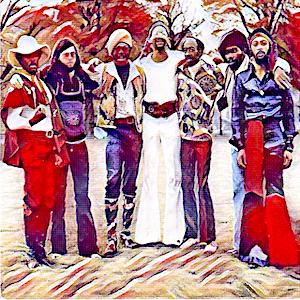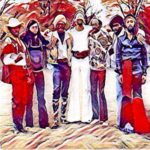

Frank Abel was the keyboardist for the Lafayette Afro Rock Band, a group that was little-known during their recording period but has since become celebrated as one of the standout funk bands of the 1970s.
The group first formed as the Vanguards, then becoming the Soul Congress, and then the Bobby Boyd Congress, in homage to their original vocalist Bobby Boyd. The band also included guitarist Larry Jones, bassist Lafayette Hudson, keyboardist Frank Abel, horn players Ronnie James Buttacavoli and Arthur Young, drummer Ernest “Donny” Donable, and percussionists Keno Speller and Arthur Young. Upon deciding that the funk scene in the United States was too saturated for them to viably compete, they relocated to France in 1971. When Boyd split from the group and returned to America, the remaining band members then settled on the name Ice.
After regular performances in Paris’s Barbès district, an area made up primarily of North African immigrants, they caught the eye of producer Pierre Jaubert and became the house session band at his Parisound studio. The influence of their surroundings led Ice to increasingly weave African rhyme schemes, textures, and beats into their established funk style. The album Each Man Makes His Own Destiny was released in 1972 under the name Ice, after which the band changed their name to Lafayette Afro Rock Band to reflect their expanded influences.
Now under the name Lafayette Afro Rock Band, they released the album Soul Makossa (also known as Movin’ and Groovin’ in the United States) in 1973. The title track was a cover version of Manu Dibango’s international hit, “Soul Makossa.” Though it failed to chart, the album made an impact years later. Its standout song, the oft-covered “Hihache,” has been widely sampled by artists as diverse as Janet Jackson, Biz Markie, LL Cool J, De La Soul, Digital Underground, Naughty by Nature, and Wu-Tang Clan.
The band’s 1975 album Malik prominently featured the Univox Super-Fuzz and liberal usage of the talk box. This album was equally influential in subsequent decades, with a sample of the song “Darkest Light” being featured prominently in Public Enemy’s “Show ’Em Whatcha Got.” The original saxophone solo on “Darkest Light” was played by Leroy Gomez, who later became popular as the lead singer of the disco group Santa Esmeralda. After Public Enemy’s usage of the song was highly praised, samples of “Darkest Light” appeared in several more notable rap and R&B songs, including “Back to the Hotel” by N2Deep, the multi-platinum 1992 single “Rump Shaker” by Wreckx-n-Effect, and the 2006 single “Show Me What You Got” by Jay-Z.
Mal Waldron collaborated with Lafayette Afro Rock Band in 1975, employing them to back him on his unreleased Candy Girl album. Shortly later, blues pianist Sunnyland Slim sought out the band’s services, resulting in the collaborative album Depression Blues. The group subsequently reverted to the Ice moniker and also used the names Captain Dax and Crispy & Co. on various releases. The 1975 album Tonight at the Discotheque was released as a “various artists” compilation but actually consisted of songs recorded by the same band under multiple monikers.
They released 1976 funky disco single “Dr. Beezar, Soul Frankenstein” under the name Captain Dax in Japan. The band members returned to America and broke up in 1978. Later that year, French record label Superclasse released the album Afon: Ten Unreleased Afro Funk Recordings. In 1999 the same label released Darkest Light: The Best of Lafayette Afro Rock Band, which rekindled interest in the group two decades after they disbanded. More compilations followed, including The Ultimate Collection in 2001, and the 2016 album Afro Funk Explosion!
Leave a Reply
You must be logged in to post a comment.